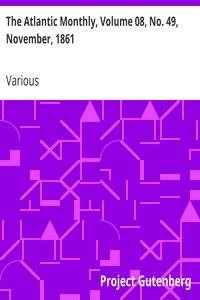|
|
Read this ebook for free! No credit card needed, absolutely nothing to pay.Words: 94937 in 18 pages
This is an ebook sharing website. You can read the uploaded ebooks for free here. No credit cards needed, nothing to pay. If you want to own a digital copy of the ebook, or want to read offline with your favorite ebook-reader, then you can choose to buy and download the ebook.

: The Atlantic Monthly Volume 08 No. 49 November 1861 A Magazine of Literature Art and Politics by Various - American periodicals The Atlantic Monthly@FreeBooksTue 06 Jun, 2023 THE ATLANTIC MONTHLY. A MAGAZINE OF LITERATURE, ART, AND POLITICS. GEORGE SAND. "Deduci superbo Non humilis mulier triumpho." At a later day we saw these things rather differently. The electric intoxication over, which book or being gives but once to the same person, its elements were viewed with some distrust. Passing from ideal to real life, as all pass, who live on, we shook our heads over the books, sighed, ceased to read them. Grown mothers ourselves, we quietly removed them as far as possible from the young hands about us, and would rather have deprived them of the noble French language altogether than have allowed it to bring them such lessons as Jacques and Valentine. Yet we retain the old love for her; the world of literature still seems brighter for her footsteps; and should we live to learn her death, tears must follow it, and the sense of void left by the loss of a true friend, noble and loyal-hearted, if mistaken. With this confession of sympathy with the woman, we begin the critical consideration of the memoirs of herself she has given to the world. These memoirs begin at the earliest possible period, including the lives of her parents and grandparents. The latter were illustrious on one side, obscure on the other. She tells us that by her paternal grandmother she was allied to the kings of France, and by her maternal grandfather to the lowest of the people. The grandmother in question was the natural daughter of the famous Mar?chal de Saxe, recognized and educated, but finally left with slender resources, and married to M. Dupin de Francueil, an accomplished person of good family and fortune, greatly her senior. To him she bore one child, a son named Maurice, after the great soldier. As might have been expected, her widowhood was early and long, for her aged partner soon dropped from her side, beloved and regretted. George tells us that her grandmother was wont to insist that an old man can be more agreeable in the marital relation than a young one, and that M. Dupin de Francueil, elegant, accomplished, and devoted to her happiness, had in his life left nothing for her imagination to desire or her heart to regret. The first volume of these memoirs gives interesting notice of the friendships which surrounded Madame Dupin during her married life. These embraced various celebrities, historical and literary. Her husband was the congenial friend of the best minds of the day, and was able, among other things, to procure her the difficult pleasure of an interview with Jean Jacques Rousseau, then living near her in great spleen and retirement. We cannot do better than to give the relation of this in her own words, as preserved by her grand-daughter. It is highly characteristic of the parties and of the times. "Before I had seen Rousseau, I had read the 'Nouvelle H?lo?se' in one breath, and at the last pages I found myself so overcome that I wept and sobbed. My husband gently rallied me for this; but that day I could only cry from morning till evening. During this, M. de Francueil, with the address and the grace which he knew how to put into everything, ran to find Jean Jacques. I do not know how he managed it, but he carried him off, he brought him, without having communicated to me his intention. The simplicity of this narration justifies its quotation here, as illustrative of the taste and manners that prevailed a hundred years ago. The lively emotion provoked by the "Nouvelle H?lo?se" is scarcely more foreign to our ideas and experience than the triangular fit of weeping in the parlor, and the dinner, silent through excess of feeling, that followed it. In the intervals of his necessary occupations he studied medicine and surgery, in the latter of which he attained considerable skill. In the many subsequent years of his country life, he made these accomplishments very useful to the village folk. No stress of weather or unseasonableness of hours could detain him from attending the sick, when summoned; but being obliged, as George says, to be ridiculous as well as sublime in all things, he was wont to beat his patients when they were bold enough to offer him money for their cure, and even made missile weapons of the poultry and game which they brought him in acknowledgment of his services, assailing them with blows and harder words, till they fled, amused or angry. Maurice, his first pupil, was a delicate and indolent child, and showed little robustness of character till his early manhood, when the necessity of a career forced him into the ranks of the great army. The tone of our author concerning this and subsequent revolutions which have come within her own observation is throughout temperate, hopeful, and charitable. The noblest side of womanhood comes out in this; and however her fiery youth might have counselled, in the pages now under consideration she appears as the apologist of humankind, the world's peacemaker. George loves to linger over the details of her father's early life. They are, indeed, all she possesses of him, as she was still in early childhood when he died. So much and such charming narrations has she to give us of his military life, his musical ability, his courage and disinterestedness, that she herself does not manage to get born until nearly the end of the third volume, and that through a series of concatenations which we must hastily review. Free books android app tbrJar TBR JAR Read Free books online gutenberg More posts by @FreeBooks
: In the Claws of the German Eagle by Williams Albert Rhys - World War 1914-1918 Personal narratives Germany; World War I@FreeBooksTue 06 Jun, 2023

: The Refugees A Tale of Two Continents by Doyle Arthur Conan - Historical fiction; France History Louis XIV 1643-1715 Fiction; Canada History To 1763 (New France) Fiction; Huguenots Fiction; Persecution Fiction Historical Fiction@FreeBooksTue 06 Jun, 2023
|
Terms of Use Stock Market News! © gutenberg.org.in2025 All Rights reserved.






